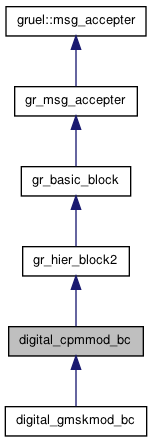digital_cpmmod_bc Class Reference
Generic CPM modulator. More...
#include <digital_cpmmod_bc.h>
Inheritance diagram for digital_cpmmod_bc:

Public Member Functions | |
| std::vector< float > | get_taps () |
| Return the phase response FIR taps. | |
Protected Member Functions | |
| digital_cpmmod_bc (gr_cpm::cpm_type type, float h, unsigned samples_per_sym, unsigned L, double beta) | |
Friends | |
| DIGITAL_API digital_cpmmod_bc_sptr | digital_make_cpmmod_bc (int type, float h, unsigned samples_per_sym, unsigned L, double beta) |
Detailed Description
Generic CPM modulator.
- Parameters:
-
type The modulation type. Can be one of LREC, LRC, LSRC, TFM or GAUSSIAN. See gr_cpm::phase_response() for a detailed description. h The modulation index.  is the maximum phase change that can occur between two symbols, i.e., if you only send ones, the phase will increase by
is the maximum phase change that can occur between two symbols, i.e., if you only send ones, the phase will increase by  every
every samples_per_symsamples. Set this to 0.5 for Minimum Shift Keying variants.samples_per_sym Samples per symbol. L The length of the phase duration in symbols. For L=1, this yields full- response CPM symbols, for L > 1, partial-response. beta For LSRC, this is the rolloff factor. For Gaussian pulses, this is the 3 dB time-bandwidth product.
Examples:
- Setting h = 0.5, L = 1, type = LREC yields MSK.
- Setting h = 0.5, type = GAUSSIAN and beta = 0.3 yields GMSK as used in GSM.
The input of this block are symbols from an M-ary alphabet +/-1, +/-3, ..., +/-(M-1). Usually, M = 2 and therefore, the valid inputs are +/-1. The modulator will silently accept any other inputs, though. The output is the phase-modulated signal.
Constructor & Destructor Documentation
| digital_cpmmod_bc::digital_cpmmod_bc | ( | gr_cpm::cpm_type | type, |
| float | h, | ||
| unsigned | samples_per_sym, | ||
| unsigned | L, | ||
| double | beta | ||
| ) | [protected] |
Member Function Documentation
| std::vector<float> digital_cpmmod_bc::get_taps | ( | ) | [inline] |
Return the phase response FIR taps.
Friends And Related Function Documentation
| DIGITAL_API digital_cpmmod_bc_sptr digital_make_cpmmod_bc | ( | int | type, |
| float | h, | ||
| unsigned | samples_per_sym, | ||
| unsigned | L, | ||
| double | beta | ||
| ) | [friend] |
The documentation for this class was generated from the following file:
